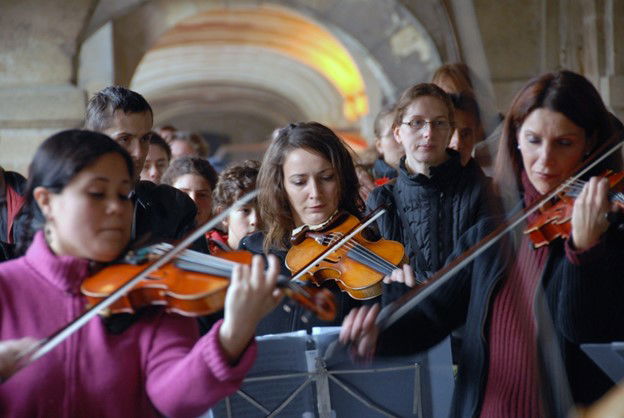How to Turn a Mediocre Music Ensemble into a Great One

The recommended techniques in this article can apply to Concert Bands, Choral Groups of all sorts, String Orchestras and other music ensembles. For the sake of simplicity, I’ll refer to all the types of music groups simply as Ensemble or Group.
Musical ensembles are a vibrant testament to musical cooperation, showcasing collective talent in a singular assembly. A "good" ensemble delivers an adequate performance, but transforming it into a "great" ensemble requires intentional efforts, commitment, and a fusion of a number of different elements provided by different individuals. Here, we explore the crucial steps to elevate a mediocre ensemble into a great one.
1. Uniting Vision and Commitment
Greatness is often born from a shared vision. Encouraging every group member to align with a common goal fosters a culture of commitment and dedication.
The primary goal, of course, is to make great music. But, great music is best when it is offered to someone. There is an innumerable collection of love songs offered to the apple of someone’s eye. There are also quite a few songs that are stories about some person or event; these are offered to an audience that relishes a good story. Lullabies are offered to children. And praise songs are offered to God. Sometimes, as in the case of purely instrumental music, the offering is of a more ethereal nature, raising the spirits or eliciting emotions from an audience. The primary goal should never be for the Group to promote its own glory.
An ensemble should seek to establish a collective understanding of what defines greatness, inspiring each member to strive for it, so that the group can be great as a unit. Is greatness simply playing or singing the notes well? Is it interpreting the composer’s intention, expressing the proper emotion through the music, performing it so that the receiver understands the message? It may be all of these, and they need to be agreed on from the start.
- This may be achieved from a commonly understood primary foundation, e.g., a Pep Band exists to pep up the team and crowd at a sports event, a church choir exists to glorify God.
- It may need to be verbalized by the director/teacher. “This piece represents the growing splendor of a sunrise.”
- It may be understood if the particular piece of music is a tradition of your ensemble, e.g., the Hallelujah Chorus at the annual Christmas concert.
2. Embrace Constant Improvement
Continuous refinement is the cornerstone of greatness. Implement regular rehearsals, encouraging focused practice sessions that target areas of improvement.
- In the case of band or orchestra music, certain tonguing or bowing techniques may need to be fine-tuned, especially if a more challenging piece is being attempted.
- As instances arise, or if a particular new concept will need to be learned, the director may need to describe that new skill and demonstrate it, or have it demonstrated. In the case of choral music, there are some pronunciation problems that only happen rarely. This wouldn’t need to be addressed regularly.
- Some concepts like dynamics and phrasing can be improved in small steps. Here, more experienced musicians have the opportunity to help the less experienced improve their skills. This is another thing with which section leaders can help. Understanding dynamics, phrasing, and the essence of the music elevates performances from a mere rendition to a compelling musical experience.
Utilize expert guidance and constructive feedback to foster individual growth, and so enhance the group's collective performance. Opportunities for this may exist as conferences for each type of ensemble, guest musicians who can explain and demonstrate techniques and practices for improvement.
4. Encourage Individual Responsibility Each member's responsibility to the ensemble as a whole is essential. Encourage self-discipline, accountability, and a commitment to personal improvement. This includes regular individual practice, good group rehearsal techniques and proper performance etiquette. Read more about The Art of Concert Etiquette. When individuals take ownership of their role, the group thrives.

5. Cultivate Unity and Teamwork
A great ensemble functions as a unified entity. Strengthening camaraderie and teamwork among members is crucial. This may be done by having an event outside of regular rehearsal times, e.g., band camp. At such an event, there can be games and activities that foster trust, collaboration, and mutual support, allowing the group to perform as one cohesive unit. When possible, it might be helpful for players or singers to play or sing a part other than their own to appreciate the effort that other members of the group need to exert.
6. Repertoire Selection and Diversity
The choice of music significantly affects an ensemble’s journey toward greatness. Choosing a wide array of music for the repertoire challenges and inspires musicians. Using music from various genres, styles, and historical periods not only enriches the group's versatility but also provides the audience with a vibrant musical experience.
7. Conductor’s Leadership and Direction
A skilled conductor plays a pivotal role in transforming a mediocre ensemble into a great one. A capable leader guides, inspires, and shapes the group's musical direction. This can be accomplished by:
- Modeling – conductors must exemplify the level of honesty, integrity and character that they wish their ensembles to demonstrate.
- Clear expectations – Besides “classroom rules” (where to keep music, how and where to unpack instruments). Conductors should verbalize what the goals of the group are. This is often simply speaking the goals but can also be reinforced by means of posters, mottos, etc.
- Reinforcement – This can come from section leaders, other teachers, parents and the community at large. Often the ensembles of a school, homeschool group or community are one of the “public faces” of that school, homeschool group or community.
8. Performance Opportunities
Regular performances, both formal and informal, are invaluable. Exposure to diverse audiences hones the ensemble's adaptability and stage presence.
- Sometimes, a choral group might be divided into smaller groups of 16 or 20 and perform at local children’s homes or hospitals, or at retirement communities. A band or string orchestra might do the same.
- Offer to play at local community gatherings, dedications or other events that usually don’t have music.
- Additionally, competing in festivals and assessments provides valuable feedback and provides a good benchmark of the group's progress.
9. Celebrate Achievements and Milestones
Recognizing accomplishments, both big and small, is crucial in maintaining morale and motivation. Celebrate achievements, milestones, and breakthroughs as they contribute to the ensemble’s journey towards greatness. Monthly awards, given at group rehearsals, for “Best Improved” or “Best Encourager” may be useful. At concerts, give public recognition for those who were chosen to participate in local, regional or national ensembles.
Conclusion
The transition from a mediocre ensemble to a great one requires a blend of dedication, commitment, and a unified pursuit of musical excellence. It’s a journey that demands collective ambition, individual dedication, and a continuous pursuit of improvement. By fostering a culture of shared vision, constant refinement, and a passion for musicality, an ensemble can transcend the boundaries of mediocrity and reach the status of greatness, leaving an indelible mark on audiences and the world of music.
Salt Cellar Creations understands the beauty and power that music ensembles can instill in the preforming group and convey to an audience. We have a growing library of original works and arrangements full of such beauty and power. Explore the offerings HERE.
SCC can also compose an original piece for you or do a custom arrangement for you. There are two ways that this can be done; one is much more affordable than the other. And SCC is always looking for ideas of pieces to arrange or suggestions for original pieces.
We have sold music not only in the US but in Canada, the United Kingdom, France, Australia, and New Zealand. Please visit the WEBSITE or CONTACT US to let us know what we can do for you!